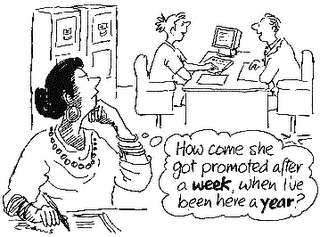 I found out that as a foreigner, getting a job is quite hard in
I found out that as a foreigner, getting a job is quite hard in I have heard horror stories where former executives, researchers and scientists drove taxis, sweeping the streets or collecting garbage in New Zealand New Zealand
As for me, I too have been through the painful process of sending out lots of CVs to the black hole and waiting in vain. At that time, I was on the verge of giving up, ready to pack up my bags, and headed back to where I came from. However, I held on.
I found a piece of article in Computerworld New Zealand magazine dated Nov 20, 2006 that highlights the problem faced by migrants with ICT talents. Before you decide decided to give up everything and hop on the plane to fly over here looking for a job, I suggest you to read the article carefully and decide whether is it worth all the risks.
Here is the transcription of the article:-
Immigrants: over qualified and over here?
(Transcribed from Computerworld New Zealand magazine, No. 958, dated 20 November 2006) - By Juha Saarinen
This may come as a surprise to some, but I am a foreigner. My foreigness started in Finland and was exacerbated through living and working in various European countries as well as Singapore before coming to New Zealand.
I have been “foreigning it” in Aotearoa for over a decade now and got away with it by and large. The food was bit difficult to handle at first (haven’t you guys heard of pickled herring, raw onion and vodka?) and one editor says he still can’t pronounce my name.
I miss proper sports like ice hockey and real football but it’s not so bad here really.
Levity apart, I was surprised to read Ulrika Hedquist’s (another foreigner) story last week on how some Kiwi companies are reluctant to hire migrants. This despite a massive skills shortage, which means employers can’t get the labour they badly need, for love or money. Despite global competition for ICT talent, these people have foregone higher-paying jobs elsewhere to live and work in New Zealand instead.
Hedquist’s isn’t the only report on migrants being discriminated against. The editor of CIO magazine, Divina Paredes, recently won the PriceWaterhouseCoopers Hi-Tech Journalist of the Year Award for a well-researched piece on overseas ICT workers being discriminated against — and industry figures are admitting it’s a problem.
I must confess that I’ve come across very little discrimination in New Zealand, compared to some countries in Europe and Asia that I’ve lived in. Then again, I’m from Europe and unless I tattoo “FOREIGNER” across my forehead, well, it’s not that obvious.
Kiwis in general are a tolerant lot and more curious than rejecting of migrants, I find. Occasionally, you will bump into some loony, like the person who asked me if I was happy being back in a First World country after Singapore, but they are rare indeed.
Having said that, more “blatant” foreigners seem to run into problems. There’s the former manager of Hewlett-Packard’s million dollar Middle-Eastern unix business who drives a taxi in New Zealand because that was the only job for him.
He said he was happy with the career change, but there was a twinge of bitterness in his voice. The bitterness didn’t come from driving a taxi as such, but from sending out lots of job applications in vain. Nobody wants to hire you because you are different, and there’s nothing you can do about it.
Much of the discrimination will be subtle too, like the dreaded “New Zealand experience” requirement. I have never come across anything like that overseas, and would love to know if Kiwis put “New Zealand Experience” as a qualification on their CVs when they go travelling.
Such institutionalised discrimination hurts not just the migrants, but also the companies that willingly miss out on qualified staff who may also bring different, refreshing views that traditional workers don’t have.
The reality is that ICT honours few boundaries like geography and ethnicity, so looking for a heterogenous staff make-up is a fool’s errand at best.
At worst, it’s firing a very large gun at both feet of your business because of irrational personal prejudice.
Speaking of personal stuff, until you experience it yourself, it’s hard to understand how painful discrimination can be. Most Kiwis of British origin aren’t likely to ever encounter it, and I hope they never will.
1 comment:
I too have found this to be true in New Zealand. Maybe I am not the best candidate for every position that I have applied for. I would expect however to gain at least one short listing or interview after sending over 30 applications for various jobs in New Zealand. Most of the time if companies can be bothered to tell you that you are unsucessful, they will not give you a specific reason why. Why? Because it is against your human rights to be turned down for a a job based on your origin. This would imply that you do not need to have the specific work visa/permit which can be obtained after a job offer. The companies in New Zealand should be employing the best employees possible rather than only NZ residents or citizens. I understand they want NZ people to have good jobs, and for them not to be taken via migrants. Protecting their residents and citizens this way will not lead to the best outcomes for the country in the long term!
Post a Comment